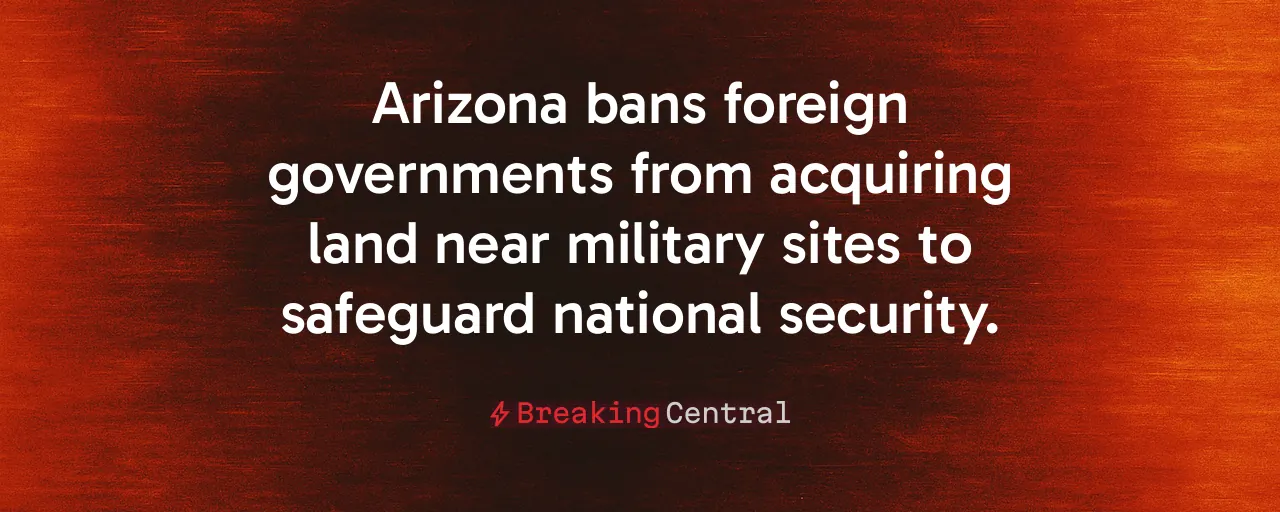A Line in the Sand
Arizona has taken a stand. Governor Katie Hobbs recently signed the Blocking Adversarial Nations Act, a law that bars governments and state-controlled entities from nations like China, Russia, Iran, and North Korea from purchasing land in the state. The move, framed as a safeguard for national security, aims to shield military bases, critical infrastructure, and vital resources from foreign influence. For a state that hosts Luke Air Force Base, where a significant portion of U.S. F-35 pilots train, the stakes are high.
This decision didn't come out of nowhere. Reports of Chinese investors snapping up land near strategic sites, like Luke AFB, have raised alarms. Add to that the federal government's sluggish response to such deals, and Arizona lawmakers decided to act. The law signals a broader push to prioritize local control and protect the state's assets from global rivals, a move that resonates with those who value sovereignty and self-reliance.
Beyond military concerns, the BAN Act aims to ensure Arizona's farmland, water, and food supply stay out of hostile hands. With the state's economy tied to agriculture and its scarce Colorado River water under strain, the law reflects a commitment to keeping resources in trusted hands. It's a bold step, but one that invites questions about enforcement and unintended impacts.
Why Arizona Acted
The need for action became clear with mounting evidence. Intelligence reports from 2024 list China, Russia, Iran, and North Korea as top security threats. In Arizona, roughly 294,000 acres of farmland have ties to Chinese investors, according to federal data. That's a small but troubling fraction of the state's land, especially when you consider the proximity of some parcels to military installations. A 2023 case in North Dakota, where a Chinese firm planned a corn mill near Grand Forks Air Force Base, showed how such deals can slip through federal oversight.
Beyond espionage risks, there's the issue of resources. Arizona's agriculture depends on finite water supplies, and foreign ownership could complicate access. The BAN Act addresses these fears by banning purchases, leases, and other acquisitions by adversary nations. It's a preemptive strike, designed to deter covert moves through shell companies or proxies, which have been a concern in other states.
Supporters counter that national security trumps those risks. The state's military bases, like Fort Huachuca, are vital to defense operations. Allowing adversarial nations a foothold nearby poses a significant risk to America's safety.
A Legacy of Vigilance
This isn't Arizona's first brush with land ownership debates. In the late 19th century, territorial laws limited corporate land holdings to curb monopolies. Nationally, early 20th-century "alien land laws" targeted Asian immigrants, later struck down for discrimination. Today's BAN Act is different, focusing on state-backed entities, not individuals. Still, it echoes a long-standing instinct to protect local interests from external control.
Recent history fuels the urgency. In 2021, a Chinese company bought 140,000 acres near a Texas air base, sparking outrage. By 2024, states like Florida and Utah had passed similar bans, reflecting a growing distrust of federal inaction. Arizona's law builds on this trend, but it's stricter, with immediate divestiture rules and enforcement through the state attorney general. It's a model other states might follow.
Balancing Security and Fairness
Enforcement won't be simple. Verifying who truly owns land through complex corporate structures is a challenge. The law tasks the attorney general with rooting out violations, but that could strain resources. There's also the risk of overreach, where lawful residents from targeted countries face scrutiny. Title companies and lenders might hesitate to work with anyone tied to these nations, creating unintended barriers.
To address this, some suggest exemptions for permanent residents or dual citizens with clear intent to settle. Others propose a public registry of foreign ownership, like federal models, to boost transparency without blanket bans. These ideas aim to refine the law, ensuring it targets true threats while minimizing harm to innocent parties.
A Broader Message
The BAN Act sends a clear signal: Arizona values its security and autonomy. By blocking adversarial nations from gaining a foothold, the state asserts control over its future. It's a stance that aligns with a belief in strong borders, self-sufficiency, and skepticism of global entanglements. For many, it's a refreshing change from federal gridlock on security issues.
The law's success hinges on execution. It aims to deter threats without alienating allies or stifling economic growth. Arizona's semiconductor and renewable energy sectors rely on foreign investment, and a chilling effect could hurt jobs. Striking that balance will test the state's resolve and ingenuity.
The BAN Act is a declaration that Arizona will defend its land, its people, and its way of life. As global tensions rise, that commitment matters. The state has drawn a line, and it's one worth watching.
